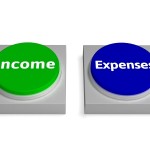Tips for Creating a Budget
 If you are looking for a great way to stop living pay check to pay check and actually start putting some money aside – a household budget may be the right solution.
If you are looking for a great way to stop living pay check to pay check and actually start putting some money aside – a household budget may be the right solution.
A budget is a powerful tool which is the basis of any effective financial plan for eliminating debt or building wealth.
A well-planned budget can help you control your spending, avoid debt and help you save for your future. It will give you a clear outlook of your spending habits whether good or bad and allow you to make sound financial decisions. At the end of the day a budget teaches positive financial habits which allows anyone regardless of their income to get ahead by living within their means.
Setting Up a Budget
Setting up a basic but effective budget is not as difficult as you may think. Its as simple as looking at what your monthly income is and then comparing that against your monthly expenditures. The time frame you use is up to you, monthly is generally the most popular as bills and paychecks are generally on a monthly cycle. Split your expenses into major categories, such as housing, utilities, transportation, food, medical, entertainment, clothing, debt, and miscellaneous. This will help you see exactly what areas you are spending the most money (or wasting). The trick now it to make sure your expenses are equal to or below your income.
The aim of a budget is to help you identify areas of wastage and then address them. Big areas where spending typically blows out include groceries, eating out/entertainment and unexpected expenses.
Resource
There are so many ways and resources available for creating a budget. There are numerous free templates to download online, there are free mobile apps and there is Microsoft Excel. In addition to the many free options, there are paid options as well, but they are unnecessary – free versions are more than adequate. Do a few searches online and see what’s available. Here are a few to get you started.
Budget Planner – by Money Smart
Microsoft templates – search through their many free budgeting templates
*In addition to the above, most banks now have free budgeting software/tools attached to your transaction accounts. These tools are incredible and will provide you with exact figures on your expenditures as it is your bank account.
Where to Cut Your Spending
Now, take a closer look at your budget and determine just where you can cut back on your expenses. Be realistic when making these cuts. For example, you cannot cut your food expense in half and expect to stick to that plan. You may be able to cut back on your food expenses by not eating out as often, but make it achievable. Make any necessary adjustments to your budget to reflect these cuts in spending.
Savings
Do not forget about your savings account. Try to set aside a set amount each month or fortnight that you can put into your savings account. Even if this is just a small amount, it will certainly add up over time. An emergency savings plan is vital for anyone hoping to gain control of their finances.
Monitor Your Budget
Make a point to evaluate your budget regularly – daily, weekly, monthly, whatever works for you. This will help to keep you motivated and hold you accountable to keeping your commitment to stick to your budget. If you notice that, you are not spending as much as you thought in one area, or your are overspending in another area, make the necessary adjustments to your budget. The main thing is to make sure that you income is matching your expenses, and that you are saving at least a little bit of money on a regular basis.
Financial Counselling
If even after keeping a household budget for a few months, or if you are having trouble creating a workable budget, you may want to seek help from a financial counsellor. A counsellor will be able to sit down with you and review your options. He/she can help you create a budget that will work for your household. The counsellor may also be able to explain various governmental benefits that are available to help you until you have control of your finances.
If you choose to seek help from a financial counsellor, be sure that they are licensed with the state in which your reside, and have a good reputation for provides financial services. Be leery of anyone, who make promises that sound too good to be true. To find a free financial counsellor in you area visit FCA
Image courtesy of Stuart Miles / FreeDigitalPhotos.net




